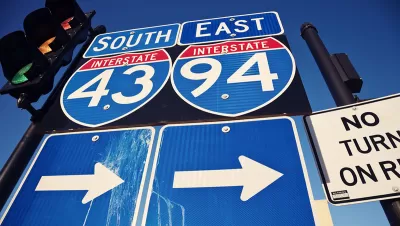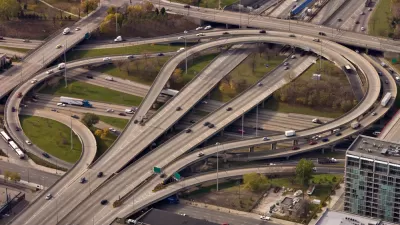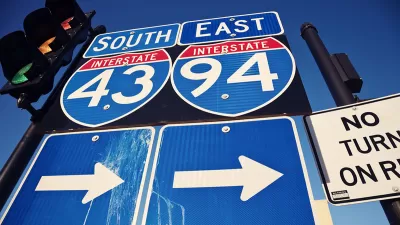The proposed widening of I-94 in Milwaukee is a $1.1 billion chunk of a $6.4 billion road widening program in the region. The NAACP sued the project as a matter of environmental justice.

"The Wisconsin Department of Transportation is asking the federal government to rescind its decision to expand a section of Interstate-94 in Milwaukee," reports Lisa Neff.
Neff reports the details of the letter, which is shared in full alongside the article, in addition to the full text of the NAACP vs. Ross lawsuit that is challenging the expansion plan. The lawsuit centers on "environmental impacts not considered during planning for the project," such as "highway run-off of oil and other vehicular fluids" and "air pollution."
Neff also adds: "Environmental hazards would disproportionately affect African Americans and Latinos, who comprise 57.1 percent of the area surrounding the project, according to the complaint."
Environmental attorney Dennis Grzezinski is quoted in the article saying the state's letter should be a "no-brainer" for the federal government to put an end of the project, but a final decision will come in a few weeks. The lawsuit, meanwhile, will stay in federal court.
For more background on the big news, see an article by Angie Schmitt for Streetsblog USA.
FULL STORY: WisDOT asks feds to rescind decision for controversial I-94 expansion in Milwaukee

Planetizen Federal Action Tracker
A weekly monitor of how Trump’s orders and actions are impacting planners and planning in America.

Congressman Proposes Bill to Rename DC Metro “Trump Train”
The Make Autorail Great Again Act would withhold federal funding to the system until the Washington Metropolitan Area Transit Authority (WMATA), rebrands as the Washington Metropolitan Authority for Greater Access (WMAGA).

DARTSpace Platform Streamlines Dallas TOD Application Process
The Dallas transit agency hopes a shorter permitting timeline will boost transit-oriented development around rail stations.

Renters Now Outnumber Homeowners in Over 200 US Suburbs
High housing costs in city centers and the new-found flexibility offered by remote work are pushing more renters to suburban areas.

The Tiny, Adorable $7,000 Car Turning Japan Onto EVs
The single seat Mibot charges from a regular plug as quickly as an iPad, and is about half the price of an average EV.

Supreme Court Ruling in Pipeline Case Guts Federal Environmental Law
The decision limits the scope of a federal law that mandates extensive environmental impact reviews of energy, infrastructure, and transportation projects.
Urban Design for Planners 1: Software Tools
This six-course series explores essential urban design concepts using open source software and equips planners with the tools they need to participate fully in the urban design process.
Planning for Universal Design
Learn the tools for implementing Universal Design in planning regulations.
Municipality of Princeton
Roanoke Valley-Alleghany Regional Commission
City of Mt Shasta
City of Camden Redevelopment Agency
City of Astoria
Transportation Research & Education Center (TREC) at Portland State University
US High Speed Rail Association
City of Camden Redevelopment Agency
Municipality of Princeton (NJ)





























